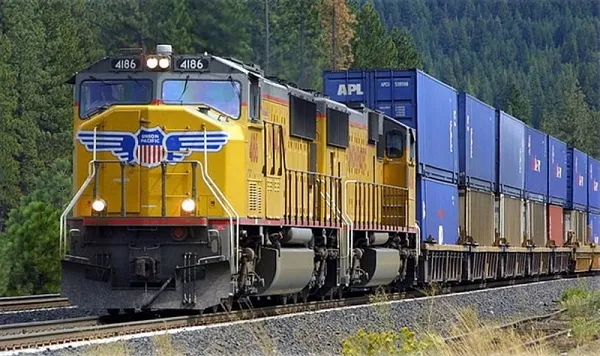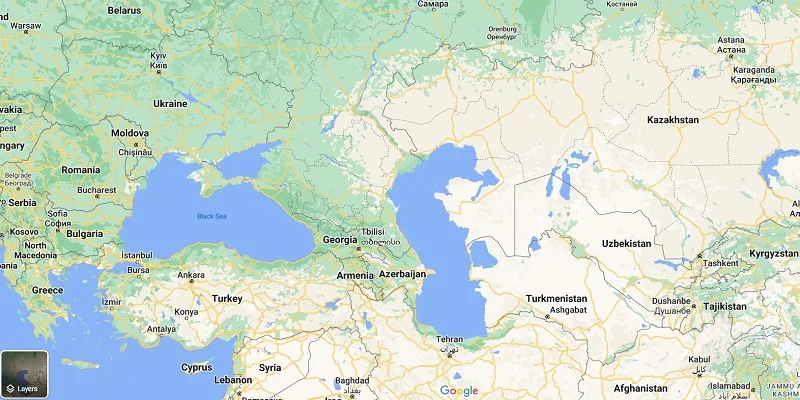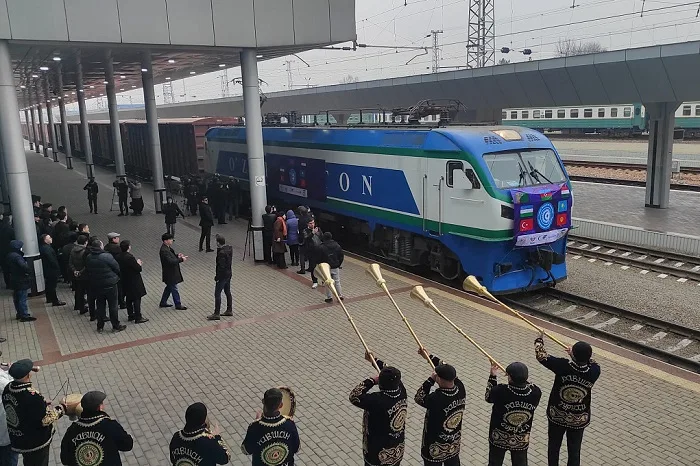

India's plan of integrating Iran's Chabahar port with the International North-South Transport Corridor will benefit Uzbekistan and other land-locked Central Asian countries to transit goods to world markets easily and a much-lesser transportation cost (Representational image courtesy: Uzbekistan Railways)
Leading Central Asia’s massive connectivity plan to strengthen ties and interregional cooperation, Uzbekistan has started delivering goods to Europe and Turkey through new railway routes.
Tashkent-based Joint Stock Company Uzzheldorcontainer, part of Uzbek Railways, has sent its first container train loaded with cargo to the Bulgarian port of Burgas.


Flagged off on December 16, the 46-car freight train carrying copper concentrate in 91 20-foot containers, is traversing through a 4000 km Uzbekistan-Turkmenistan-Azerbaijan-Georgia-Bulgaria route which also includes the Caspian and the Black Sea.
Earlier this month, the first cargo train from Turkey to Uzbekistan arrived in Tashkent through a new transport transit corridor.
The train with 40 wagons began its journey from Gumruh station in Turkey’s Izmir and is the first freight train on the Turkey-Iran-Turkmenistan-Uzbekistan route.


The development is also expected to boost India’s grand plan of improving the transport and logistics architecture of the Eurasian region.
Much before it took over the presidency of the Shanghai Cooperation Organization (SCO) in Samarkand this September, New Delhi has for long been pitching its proposal to include Iran’s Chabahar port within the framework of the International North-South Transport Corridor (INSTC).
The mechanism would allow Uzbekistan and other Central Asian countries to transit goods and reach the main world and regional markets much more easily.
Since the takeover of operations by India Ports Global Chabahar Free Zone (IPGCFZ) in December 2018, the Shahid Behesti Terminal of Chabahar port has witnessed a gradual increase in transit traffic between Central and South Asia through the transportation corridor.
Chairing the First India-Central Asia Meeting of National Security Advisers/Secretaries of the Security Councils held in New Delhi around two weeks ago, National Security Advisor (NSA) Ajit Doval stated that greater connectivity could be a force multiplier for enhancing trade and commerce, as well as closer interactions, between India and Central Asian countries.
The meeting saw participation from the NSAs/Secretaries/top officials of Kazakhstan, Kyrgyzstan, Tajikistan, Uzbekistan, and Turkmenistan.
Connectivity, including greater usage of the Chabahar port and the INSTC, was also labeled as a key to unlocking the trade potential of the region during the meeting between Prime Minister Narendra Modi and Uzbekistan President Shavkat Mirziyoyev in Samarkand on September 16.
While Mirziyoyev also remains keen on developing other major regional railway infrastructure projects – including the construction of the 454 Km Uzbekistan-Kyrgyzstan-China and the 765 Km Termez-Mazar-i-Sharif-Kabul-Peshawar railway route – experts reckon that Chabahar remains the fastest and most convenient way to significantly increase the logistics capabilities of Uzbekistan.
Also Read: A connected Eurasia is closer to reality as India takes over SCO presidency
The body of the late Pope Francis will be transferred to St. Peter's Basilica on…
The case of Baloch human rights activist Dr Mahrang Baloch has been officially accepted for…
The World Uyghur Congress (WUC) has vehemently opposed the current social media spread of propaganda…
Flipkart, India's leading e-commerce platform has decided to relocate its holding company from Singapore to…
Union Minister of Heavy Industries and Steel H D Kumaraswamy welcomed the decision of the…
As Prime Minister Narendra Modi embarks on a crucial two day visit to Saudi Arabia…